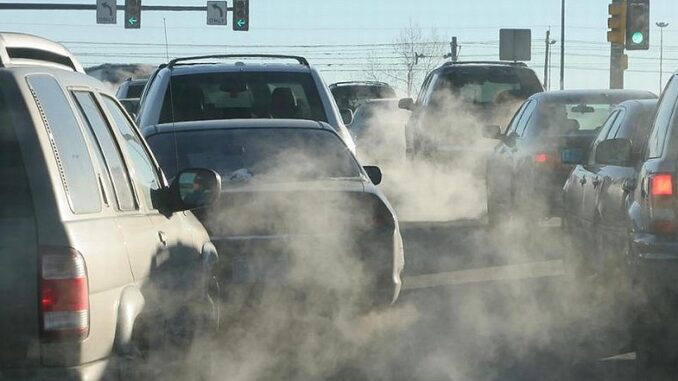
BOSTON, Massachusetts, June 19, 2024 (ENS) – Air pollution is increasingly impacting human health, finds the State of Global Air report published in partnership with the UN Children’s Fund, UNICEF. The report warned today that air pollution accounted for 8.1 million deaths globally in 2021, and unclean air is now the second leading global risk factor for premature death.
This latest edition of the report, released by the Health Effects Institute, an American nonprofit based in Boston, Massachusetts, revealed that air pollution caused 8.1 million deaths worldwide in 2021 and many millions are dealing with debilitating chronic diseases, leaving healthcare systems, economies, and societies.
The report found that children under five are particularly vulnerable to air pollution, which claimed over 700,000 in this age group dead in 2021.
In fact, children are “uniquely vulnerable” to air pollution, and effects can begin in the womb, the report shows. The Health Effects Institute reports that young children’s exposure to air pollution has resulted in one in five deaths globally, from pneumonia and asthma to low birth weight. It affects children struggling with inequities more than it does those in high-income countries.
UNICEF Deputy Executive Director Kitty van der Heijden said that nearly 2,000 children under five die every day due to the effects of air pollution.
‘The global urgency is undeniable,” van der Heijden said. “It is imperative governments and businesses consider these estimates and locally available data and use it to inform meaningful, child-focused action to reduce air pollution and protect children’s health.”
The report includes data for more than 200 countries and territories around the world, indicating that nearly every person on earth breathes unhealthy levels of air pollution every day, with far-reaching health implications.
In addition to reporting on the negative effects of air pollution on human health, the State of Global Air report finds hope in fact that there has been better awareness about the harms of being exposed to household air pollution and a 53 percent decrease in the death rate of children under five since the year 2000 due to increased access to clean energy for cooking.
Health Effects Institute President Dr. Elena Craft said she hopes the information in this report will inspire positive change. “Air pollution has enormous implications for health. We know that improving air quality and global public health is practical and achievable,” she said.
The State of Global Air report found that pollutants like outdoor fine particulate matter (PM2.5, which stands for particles that are 2.5 micrometers or less in diameter) caused more than 90 percent of global air pollution deaths. They were found to be the “most consistent and accurate predictor of poor health outcomes around the world.”
These fine particles are emitted by burning fossil fuels and biomass for transportation, to heat and cool homes, offices and stores, and by wildfires.
PM2.5 particles of air pollutants are so small that they can travel deeply into the respiratory tract, reaching the lungs, causing short-term health effects such as eye, nose, throat and lung irritation, coughing, sneezing, runny nose, and shortness of breath.

Other pollutants such as household air pollution, ozone (O3), and nitrogen dioxide (NO2) – which can be found in traffic exhaust – also contribute to the global deterioration of human health.
In addition to affecting people’s health, pollutants like PM2.5 add to greenhouse gases that are warming the planet. As the earth warms, regions with high levels of nitrogen dioxide (NO2) will experience greater levels of ozone, which can result in greater health effects.
Head of Global Health at the Health Effects Institute Dr. Pallavi Pant said, “This new report offers a stark reminder of the significant impacts air pollution has on human health, with far too much of the burden borne by young children, older populations, and low- and middle-income countries.”
“This points sharply at an opportunity for cities and countries to consider air quality and air pollution as high-risk factors when developing health policies and other noncommunicable disease prevention and control programs,” Dr. Pant explained.
Also, regions experiencing the highest levels of air pollution have begun to address the issue by installing air pollution monitoring networks, implementing stricter air quality policies and more – particularly in Africa, Latin America and Asia.
This State of Global Air report was produced by the State of Global Air Initiative, a collaboration between the Health Effects Institute and the Institute for Health Metrics and Evaluation’s Global Burden of Disease project, in partnership with UNICEF.
The report is based on data from the Global Burden of Diseases, Injuries, and Risk Factors Study of the Institute for Health Metrics and Evaluation. This collaboration of more than 10,000 researchers worldwide produces globally comparable estimates of the impact of 88 environmental, behavioral, and dietary risk factors on health across 204 countries and global territories.
Featured image: Car exhaust contains high amounts of air pollutants, as these cars driving in California are doing. February 2023 (Photo courtesy University of California, Davis School of Veterinary Medicine)
© 2024, Environment News Service. All rights reserved. Content may be quoted only with proper attribution and a direct link to the original article. Full reproduction is prohibited.



